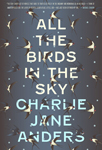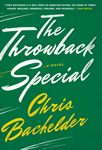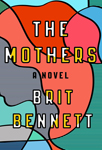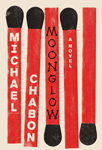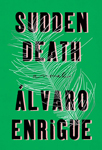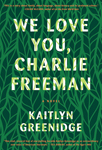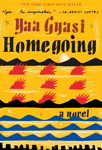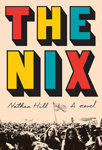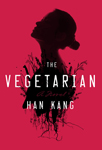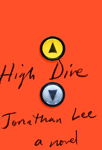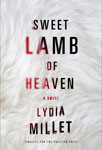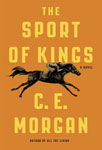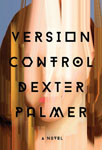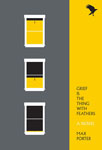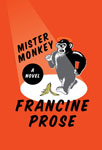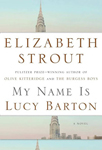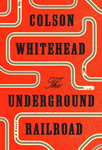by Charlie Jane Anders
Buy it at Powell’s »Nicole Chung: I agreed to be a judge back in November, before I could know that three straight months of rage and disgust punctuated by frequent, sometimes emotional calls to my elected representatives would nearly destroy my ability to focus on even the most engrossing reading. I dared these books to break through the ever-present haze of anger and provide some overarching message of courage or hope; to mean something to me at a time when only the onslaught of horrific news seemed to matter in the slightest. This was probably not the best approach, and rather unfair of me. That I was not disappointed is surely more than I deserve.
I read The Nix first because it arrived first, and also because it is more than 600 pages long and I was afraid to leave it for last. Samuel Andresen-Anderson’s mother abandoned him and his father when he was a boy; the first he hears of her in decades are headlines following her arrest for throwing rocks at an “antielitist populist” governor with presidential aspirations (Faye’s lawyer: “It’s fair to say she’s reached viral status, sir. Meme status”). I believe I was destined to appreciate this book in part because I am adopted: Any story told in the yawning, yearning space created by the inexplicable absence of a parent who was always supposed to be there and isn’t will just get me, personally, every time. Samuel might be ready to betray his mother to deliver on a long-promised book deal, but mostly he just wants to know why she left him—and it’s that question, more than any other, that kept me reading.
The Nix is really Faye’s saga, though, and in a time when toxic masculinity has been elevated to the White House, it’s all too easy to resent those trying to contain and control young Faye; to wish for her still more gumption, more chances for rebellion. When she tries to seize the life she believes she is meant for, if only for an instant, you understand why:
She will wonder how she is capable of being such different people: the real Faye and the other one, the brash and aggressive and impulsive Faye. She will long for this other Faye. As the years mount and her days become cluttered with chores domestic and infantile, she will think about this night so often that it will begin to feel more real to her than her real life.
I’ll probably sound insufferable for saying this, but one of the things I liked best about both Faye and Samuel is that they somehow made it this far, haunted and battle-scarred and more than a little bit bitter, still stubbornly attached to this notion of doing “the right thing.” Of course, on the other hand, you have Samuel’s longtime editor, Guy, who insists that discerning between “true” and “false” is foolish: “The world has pretty much given up on the old Enlightenment idea of piecing together the truth based on observed data,” he says. “Instead, it’s way easier to ignore all data that doesn’t fit your preconceptions and believe all data that does.”
Samuel speaks for us all when he says, “This sounds awful.” And he’s right, it is awful, but for me it was also strangely validating to read those lines right now. Suffering through this evil reality show of an administration, it’s impossible to digest Guy’s boasts about selling lies without thinking, “Yep, that’s partly how we ended up here!” And then you (well, I) forgive Nathan Hill for hitting really fucking close to home, because his book is so funny and wonderful.
Faye’s maxim—“The things you love the most will one day hurt you the worst”—was still bumping around my brain as I read Francine Prose’s Mister Monkey, in which many hearts strive and break for love or art and “everyone is happy to be here and disappointed to be here.” I grew up worshipping at the altar of musical theater, and would have happily gobbled up a much longer novel about a terrible off-off-off-off-Broadway show. I loved how each chapter felt like a short story, the characters’ paths criss-crossing through the disparate narratives.
My favorite chapter is the one about an older man who brings his grandson to a performance. It includes a sendup of modern privileged parenting that reminded me of many other such sendups, but what knocked me back were the gorgeous reflections on aging and shame and strained family ties: “He can’t fault [the parents] for having nothing left for themselves, or for each other, or for him. Especially him, with whom every interaction is a memento mori.” (OK, that’s lovely, but why did it almost make me, a woman in her mid-30s who is going to live forever, cry?? This is what I mean when I say that I’m fragile these days, you guys.) It’s the grandfather’s helpless love for the boy—who isn’t really his to cling to—that affected me most:
…even his most lighthearted moments with the boy are marred by hopeless yearning. Because the force of the grandfather’s love can never be returned, because the child is who he is, because the grandfather is who he is, and because it would go against the natural order for the child to be as obsessed with him as he is with the child.
Mister Monkey is billed as comedy, but I think it shines in these little moments of desperate fragility. The characters Prose creates are so real, their fears and passions so understandable, even ones you dislike or pity become people you care about in just the few pages allotted to them. Still, the ending left me wanting a bit more. We know the fate of the show—knew, really, from the hilariously bad opening lyrics—but while two of our number have careened toward a meet-cute by the end, I expected all these strange lives and varied perspectives to coalesce, somehow, for a bigger and more satisfying conclusion.
The Nix might offer too buoyant and tidy a resolution, considering its conflicts were three generations and 600-plus pages in the making. Certain parts could have been trimmed—I struggled with the chapters devoted to “Pwnage,” a character who devotes every waking moment to the World of Elfscape game Samuel is also obsessed with, and Laura, Samuel’s entitled, plagiarizing student who will doubtless make many professors cringe-laugh. Is The Nix a little too long? Probably. But its heft and beauty makes it the more satisfying read, a snap to fall into and get lost in if that’s what you need during this awful time. Mister Monkey illuminates and takes deadly aim at people’s weaknesses, their heartbreak, and their hopeless dreams; The Nix delivers a sweeping history and a pair of strange protagonists who are similarly scarred, but perhaps beginning to recover some of what they’ve lost. I freely admit the latter is more what I want right now. The Nix felt like a gift, one I sorely needed.
Match Commentary
By Kevin Guilfoile & John Warner
Kevin Guilfoile: First, I want to say something to every person writing a novel: Your book is too long.
I don’t know what it’s about. I don’t know how many pages it is, or how small the font. I don’t know if it systematically dismantles the psychic black ops site where the human soul suffers its existential torture. But it’s definitely too long.
The best friend a novelist has is a trusted first reader, and the way that you know that person is a trusted first reader is if they hand your manuscript back to you after they finish it, and the first thing they say is, “It’s way too long.”
The Nix is too long. It’s also great.
I have talked about my theory that every time we read fiction we are trying to recapture some feeling we had when we were young, reading a novel completely outside of time, and it just clicked for us. Reading The Nix was one of the few experiences I had like that this year. It was a story I became fully immersed in, and reminded me in parts of both Irving and Tartt, both writers I have loved for a long time.
Those parts, specifically, are the flashbacks to the lives of younger Samuel and younger Faye. These passages are rich with feeling and wonderful characters and exciting adventures. Hill navigates the multiple time frames with incredible skill. He illuminates time and place extremely well.
As Judge Chung notes, the stuff in the present is less interesting and even a bit problematic. It’s structurally necessary, but it’s tonally different—more comic, I suppose—and it kept raising questions that yanked me back from the immersive world of the novel’s best parts. Would a video of this woman throwing rocks at a presidential candidate really go viral? And even if it did, would anyone wait two days to skim the basic facts of her biography, much less the months it would take to research, write, and publish even a quickie book about her? (There is something like an explanation offered for this, but anyone with even an incidental knowledge of publishing will find it preposterous in the extreme.) I assume we weren’t supposed to take any of that very seriously, but there weren’t really any cues in the text to that effect. Chung rightly points to the (sometimes long) chapters about Pwnage, which are not fascinating the way the chapters about young Samuel and Faye are.
But this stuff is just the sinew holding together the other stuff, and the other stuff is so good. I gladly spent time with Pwnage as the price of admission to the Faye and Samuel Show.
I’ll amend my earlier advice. Your novel is too long. Write it anyway.
John Warner: In my year-end Biblioracle Book Awards I gave The Nix my “Book That May Restore Your Faith in Humanity” award because it’s one of those books that, for all the drama of the telling, makes you feel that things are going to be OK for these people in the end. That’s a very enjoyable reading experience, and one of the reasons the novel got such traction with audiences. You can safely recommend it to someone without worrying about them coming back to you and asking, “Why the hell did you tell me to read that book?” and looking at you funny, as has happened to me when I’ve recommended something like Geek Love to the wrong reader.
The variance in tones among the different threads shows. But I’d hate to see the tour-de-force chapter when Samuel confronts an academically dishonest student—the showdown is structured as a series of logical fallacies—be cut, just because it stands out from the rest. It’s too much fun.
Yes, as Judge Chung notes, that move toward safety for the characters may make things too “tidy,” but by the time it happens we’re more than willing to forgive that sin, if it’s even a sin in this context. I had the identical experience as Chung, The Nix being the book I “needed” at the time I read it.
Kevin: That stuff between Samuel and his student is a great example. It’s hilarious. I imagine from the perspective of someone who teaches English (as you do) it splits an arrow in the center of its target. It’s also completely superfluous. The story doesn’t need it at all. It contributes little in terms of Samuel’s character development (in fact a great many pages are spent drilling into the backstory and psyche of that student, which Hill never pays off), and with the exception of a brief, late callback that is supposed to further demonstrate the dire straits Samuel has created for himself, the novel almost completely forgets about the whole episode. I sympathize with Hill, though. When you’re writing your first novel, you want to put every good idea you have in the book. And once a passage that good is in your manuscript, it’s very difficult to take out. However, it’s basically an excellent and unrelated short story inserted into the first third of the novel. To invent a new abbreviation, tl;ria:li.1
In my capacity as parent, I have been to many, many “made for the kids” stage shows like the one in Mister Monkey. This fact, combined with my increasing age, is probably why I also related best to the chapter about the older man who took his grandson into the city to see the play. (I’m also writing a novel about a grandfather. The Moose chapters were my favorite part of High Dive. You and I identified with all the young characters when we started doing this, John. What the hell happened?)
Prose connects these stories almost like runners in a relay, with each character handing the baton to the next one for a kind of Rashomon-like account of the play. It’s clever and done expertly, and although it starts in a broad comedic style, as the story progresses it starts to drill deeper into the psyches of its cast. You never feel a tonal shift, but the book evolves in this way, to borrow a theme. It’s effective. It didn’t have the same impact on me that The Nix did, but it’s as easy a recommendation as any novel on the shortlist. Lots of folks will like this novel.
Also, here’s a tip: The SpongeBob Musical that’s coming to Broadway this year. Better than you’d think.
John: In my Biblioracling capacity I also awarded Francine Prose the first “Biblioracle Lifetime Achievement Award for Writing Good Stuff.” As the ToB overlords began assembling the long and short lists for this year’s tournament, I may or may not have said something like “Either Mister Monkey is in the tournament or I’m burning the whole mofo down and I don’t care who knows it.”
Francine Prose is in my top echelon of contemporary novelists, someone whose new books I buy the week they come out. I loved Mister Monkey. Structurally, it’s really a set of interlinked short stories. It’s less overt than Homegoing, and the “relay” covers a much shorter period of time, but the approach is highly similar.
Prior to writing this commentary I picked up my copy just to refresh my feelings for Mister Monkey and I fell right back into the book, reading 50 pages before I could break away and get back to some pressing deadlines. Whatever Francine Prose is up to, my heart just wants to say, “Yes.”
Kevin: Monday we start the semifinals (it is not as complicated as it sounds, or maybe it is) with a speculative fiction throwdown: The Underground Railroad meets the upstart Version Control. Author Rahawa Haile will be doing the sorting, and our guest commentators will be Lindsay Lynch and Halley Parry (who both have names that sound like they should be movie stars) from Nashville’s Parnassus Books, which was co-founded just a few years ago by former Rooster contender Ann Patchett.
And as we look to the Zombie results we see that Mister Monkey does not have enough votes to move it into Zombie contention.
John: Gahhhhhhh! I’m coming for each and every one of you who failed to vote for Mister Monkey.
Kevin: As of today, our Bibliographical Biters remain The Vegetarian and All the Birds in the Sky.
And for a full breakdown of the quarterfinals, join Christopher Hermelin and Drew Broussard of So Many Damn Books tomorrow at 12 Eastern on the ToB Facebook page for their third live video recap, where they’ll be discussing the week’s judgments and taking questions and comments from viewers.
1Too long; read it all: loved it. ↩



